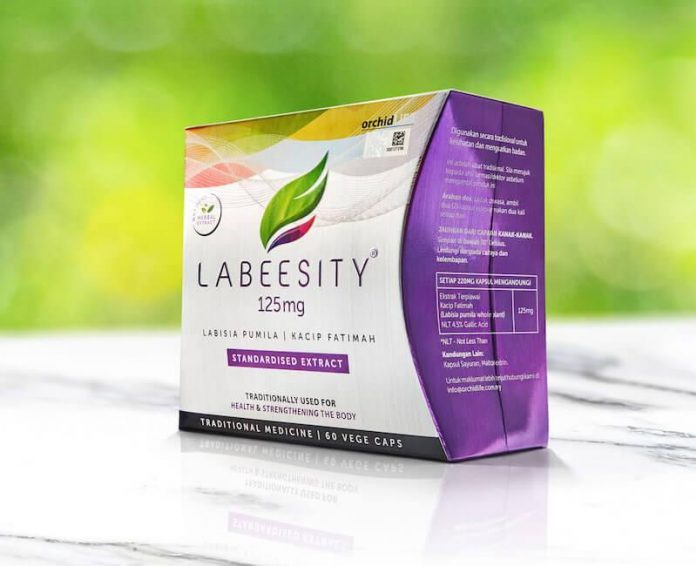Medika Natura’s Bioactive from Kacip Fatimah gets USFDA nod as a New Dietary Ingredient

by admin

The Petri Dish – 17 August 2021
BY DR MAHALETCHUMY ARUJANAN & SAARANI
MALAYSIA has one of the oldest rainforests in the world and is globally well renowned as a tropical biodiversity hub. The country hosts hundreds of species of medicinal plants with a trove of indigenous knowledge on how to use these healing greens as a natural panacea.
One of Malaysia’s popular herbal plants Kacip Fatimah (Labisia pumila) touted as a natural tonic for women and used during afterbirth care will soon be going places. This is thanks to Medika Natura, a local biotech firm that is looking into ways to take this age-old Malay portion into the international market.
According to Abdul Razak, the CEO of Medika Natura, Kacip Fatimah is being rebranded so that its health benefits can be enjoyed by consumers in the western world and across Europe and Asia.
In 2020, the company was successful in gaining New Dietary Ingredient registration and clearance for a Kacip Fatimah-derived bioactive called SFK7® from the US Food and Drug Authority (USFDA) and is currently pending registration from the European Food Safety Authority (EFSA) as a Novel Food. This is the first Malaysian native ingredient or product to get the FDA clearance.
Says Abdul Razak, “We have established scientific studies on the effectiveness of Kacip Fatimah as a dietary ingredient to fight obesity. There are also ongoing studies on diabetes and cancer, as well as future studies planned to fight Covid-19 using SKF7®”.
If the discovery of drugs is serendipitous, working on traditional herbs is based on indigenous knowledge. Lady luck smiled upon Medika Natura and blessed it with promising research undertaken by a public university. How far this SME has come now is beyond luck because hard work, perseverance, and a sharp learning curve were all part of their success journey.
Medika Natura is one of the companies under the Malaysian Technology Development Corporation (MTDC) ecosystem. MTDC via its Centre of 9 Pillars™ (Co9P™) provides a huge platform among the SMEs to adopt and deploy Industry 4.0 technologies (I4.0). The Co9P™ is a community-based centre to help nurture Industry 4.0 innovations which will help accelerate technology scale-up for small and medium-sized organisations.
MTDC works with strategic partners and SMEs to champion and engineer an I4.0 ecosystem. Co9P™ tie up SMEs and technology providers to accelerate technology transfer and commercialisation – serving as an ecosystem primarily for their fund recipient companies and facilitate collaborative networks with researchers, industry experts, and technology providers.
In 2006, Razak co-founded Orchid Life together with Mustadza Muhamad to undertake tissue culture of orchids using technology from Universiti Putra Malaysia (UPM). Orchid Life’s first funding from MTDC was in 2007, where they received their first grant under the Technology Garage Fund Scheme (TGFS) for their tissue culture project on tropical orchids. The company was later renamed Medika Natura in 2019 to reflect its key activities in biopharmaceuticals, and medicinal plants research later in 2010. The rest is history with a series of extraordinary international accomplishments.
“MTDC was a blessing for us. We graduated from the Technology Garage Fund Scheme (TGFS) programme in 2009 and in 2017, we had a meeting with Puan Mariamah Daud who is now the Director Technology Development Division and was introduced to the existing MTDC technology ecosystem and funding. Soon after, we were given access to the Commercialisation of R&D Fund (CRDF) to assist us in the commercialisation of Kacip Fatimah anti-obesity research from USM,” says Abdul Razak.
Entrepreneurship with a scientific mind
According to Abdul Razak, a team of researchers in Universiti Sains Malaysia (USM) headed by Prof Zahari Ismail showed that Kacip Fatimah has good anti-obesity properties. “USM conducted pre-clinical studies on obesity and we wanted to take this towards therapeutic claim beyond the supplement category”.
He said the pursuit to make the Kacip Fatimah bioactive ‘SKF7®’, to be registered and approved as an anti-obesity ingredient made Medika Natura achieve many milestones never attained in Malaysia before. First, the SKF7® was registered as a Traditional Medicine under the brand name Labeesity®. CRDF fund approved by MTDC was utilised to acquire the Trademark and IPR for Labeesity® from USM. The funding also supported the cost of production, advertisement, marketing and promotion, key components for viable commercialisation. Unlike traditional natural product companies, Medika Natura decided to take the path least travelled – clinical studies and approvals from drug authorities.
“We submitted an application to the US FDA under the New Dietary Ingredient with the goal to get SKF7® approved to enter the United States market. It was not an easy feat as no one in Malaysia had done it before. There was no reference for us or someone who could guide us. We grappled in the dark but finally learned the ropes of the trade and SKF7® was given clearance in 2020,” says the elated CEO and entrepreneur.
“Our success shows that it is not impossible to get FDA clearance. It took us longer because of a lack of industry guidance and precedents. Our preparation started in 2015 towards the FDA clearance and we took almost five years to develop the data for the product dossier,” Abdul Razak explains.
The “firsts” in Malaysia
- 1st natural product with anti-obesity properties that has undergone multiple clinical studies.
- 1st natural product from Malaysia to be accepted as New Dietary Ingredient by US FDA
- 1st clinical study conducted in Indonesia for a Malaysian product and biopharmaceutical company
- 1st natural product application to European Food Safety Authority (EFSA) from Malaysia as Novel Food
- 1st natural product from Malaysia to undergo clinical studies in multiple countries
Medika Natura embarked on anti-obesity clinical studies in Malaysia, Indonesia and India, again another first for a Malaysian natural product. In Malaysia, clinical studies were carried out in six Ministry of Health facilities in Penang, Perak, Selangor and Negeri Sembilan. Four public health facilities in Indonesia collaborated while in India, a private hospital in Hyderabad became a partner. The company took three years to make its presence felt in Indonesia.
The success of the obesity studies resulted in a new patent filing that documents an improvement of the initial formulation. At the time of this article, all clinical studies have successfully completed patient recruitment and treatment, and currently undergoing data analysis.
What’s next?
Now that the scientific foundation has been laid, Abdul Razak is focusing in making a viable business plan. Medika Natura is planning to be listed in the Hong Kong Exchange and Clearance (HKEX) under the biotechnology chapter in 2023
“We are raising funds from regional investors from fund managers in Singapore, Japan and the U.S. This is coupled with expanding our business in Malaysia and Indonesia,” says Abdul Razak.
They are not stopping there. Medika Natura will be exhibiting its product at the upcoming Dubai World Expo.
But how does Medika Natura plan to sell its product? “It will be a prescription, OTC, or OTX drug depending on each country’s regulatory policy and we plan to sell in Malaysia, Indonesia, Singapore, and the U.S . In Indonesia, it will be a finished product,” Razak explained.
In the pipeline
SFK7® is not going to be all about obesity as it is showing promises for diabetes, cancer, and also Covid-19. Research with UPM and Universiti Kebangsaan Malaysia (UKM) is in the pre-clinical stage for diabetes and cancer. A preclinical research project on COVID-19 was completed and subsequent work is ongoing with the Institute for Medical Research (IMR). This is a solid public-private collaboration expected from start-ups to build the biotechnology industry in Malaysia.
When asked how the diabetes and cancer research was conceived, Abdul Razak says they connected the dots between the relationship of obesity and diabetes and prior studies conducted by Professor Zhari Ismail and his team on anti-cancer.
The journey
Abdul Razak and Medika Natura have come a long way. Working with highly credible research partners also meant Medika Natura’s facilities have to comply with many good practices. Over the seven years, Medika Natura built its preclinical and clinical research capabilities and know-how.
“We work with clinicians, pharmacists, chemical engineers, biochemists, virologists, toxicologist and bio-statisticians to provide us with highly scientific data. We also have many in-house skilled and professional talents,” says Razak citing another example where Medika Natura contributes as a biotechnology company in providing jobs to local talents.
Bioentrepreneurship is not for the faint heart, but it is rewarding. Razak had his scariest moments too. “We had gone through tough personal and corporate financial challenges at our lowest point of the curve during the long gestation of a biotech start-up. There are no books to tell you how to walk the real journey,” Razak says with a big smile.
Razak aims to make Medika Natura a leader in Asia in natural products and with all that he has under his belt, there is no doubt he is going in the right direction. Medika Natura believes that “science is at the heart of everything we do”.





